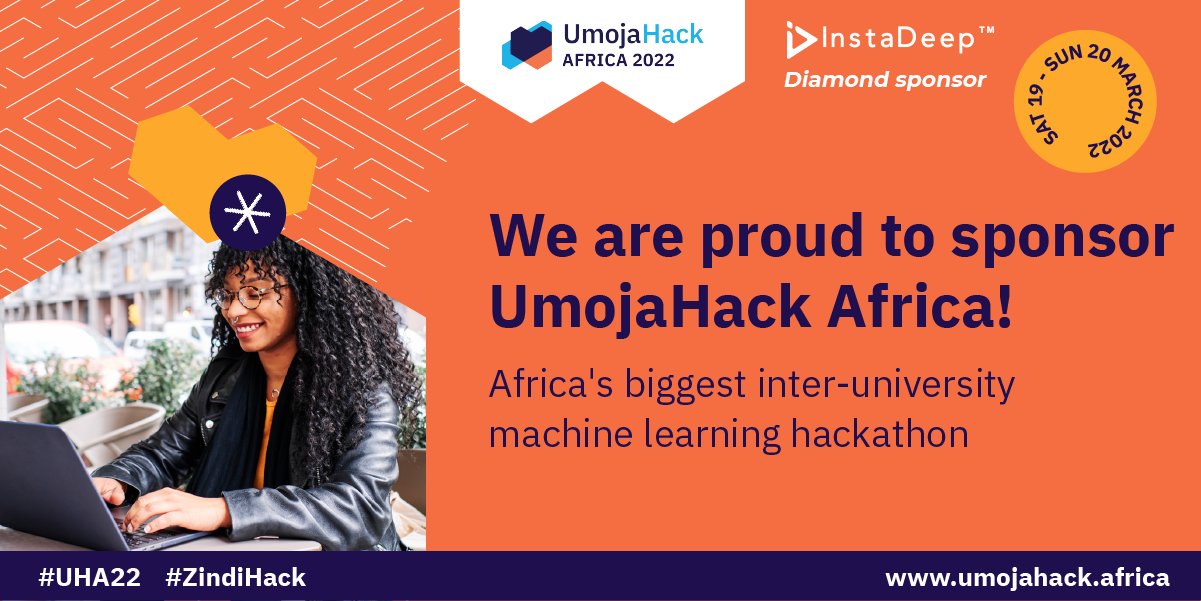InstaDeep is proudly sponsoring the third annual UmojaHack Africa, Africa’s biggest inter-university machine learning hackathon covering 30 countries, 200 universities and 2000 students. As part of the event, InstaDeep has co-organised the 2022 advanced-level challenge in conjunction with Tim Jenkins of the Technical University of Denmark (DTU). The challenge focuses on how well commercial antivenoms work against African snake toxins, and asks participants to build a machine learning model that can predict how strongly a given string of amino acids from a snake venom toxin protein binds to eight different commercial antivenom antibodies. It is being hosted on the popular Zindi data science competition platform. Other sponsors of the event include DeepMind, Nvidia, AMLD Africa and more.
Karim Beguir, Co-Founder and CEO of InstaDeep will be speaking at the event. Ahead of the competition, he remarked, “we are delighted to sponsor Umoja Hack Africa 2022, as part of our ongoing commitment to empowering AI and ML talent on the continent. We are looking forward to innovative and exciting results that proves that Africa is a world-class hub for artificial intelligence skills”.
“Zindi believes in teamwork, collaboration, and partnerships to introduce and support machine learning and AI initiatives on the African continent,” continued Celina Lee, CEO and co-founder at Zindi. “In finance, the environment, healthcare, and beyond, we are working with organisations like InstaDeep towards common goals of making AI accessible to everyone while also laying the foundation for a professional network of scientists, engineers, academics, and other data practitioners.”
Improving antivenom efficacy
The toxins in snake bites cause hundreds of thousands of deaths and permanent disfigurements across Africa every year. These injuries and deaths are statistically higher in more disadvantaged areas, which has historically meant lower interest and funding for research and development of new treatments. At present, the only effective treatment (polyclonal antibodies) is unreliable and under-researched in terms of which toxins they bind to, as well as the location of the binding.
Understanding how and where antibodies bind with a specific toxin provides the ability to predict what toxins a specific antibody can neutralise, rapidly improving patient treatment by incorporating specifically engineered antibodies, and forming part of the next-generation of snake bite/antivenom treatments.
The data
The challenge dataset, provided by InstaDeep, stems from a high-density peptide microarray experiment that aimed to address how cross-reactive 8 different commercially available snake antivenoms are and where in the toxin sequence the antibodies they contain bind the toxin (epitope).
Each row in the dataset represents a k-mer (16 amino acid sequence within the toxin) and it has a signal column coming from the high-density peptide microarray experiment.
Competitors will need to predict the signal column generated by a given Toxin_K_mer and Antivenom, using any other column available in the test set to enhance your predictions or enrich your data. The protein prot_bert embeddings for each row will also be provided.
The competition
UmojaHack 2022 runs from 19-20 March 2022, and participants can sign up here. The competition is open to registered students at African universities, as individuals or teams, up to a maximum of four per team. All solutions must use publicly-available, open-source packages only, and competitors (whether individuals or teams) may use only the datasets provided for this competition. Competitors may make a maximum of 75 submissions per day, up to a maximum of 150 submissions in total for the public leaderboard. Two submissions must be nominated to be judged for the private leaderboard. Full rules, entry requirements and evaluation criteria are on the Zindi website.
About Zindi
Zindi is an African data science competition platform and community, where data scientists and ML students and experts can access African datasets and solve the most pressing African problems. Zindi works with companies, non-profit organisations, and government institutions to develop, curate, and prepare data-driven challenges. Solutions for Umoja Hack will be ranked automatically by the accuracy achieved.
Prizes
For Umoja Hack 2022, prizes are available for first ($1200), second ($1000) and third place ($800). A country prize of $100 will also be given to the highest ranking user/team from a specific country that didn’t win any other prize.
New to competitions or want to practice?
If this is your first machine learning challenge, Zindi has a step-by-step guide on what to do. Or if you just want to refine your skills and prepare for the real challenge, why not test your skills at the Umoja Hack 2022 Advanced Practice Challenge website?
In addition, InstaDeep’s Nicolas Lopez Carranza (DeepChain and Bio AI Lead) and Mohamed Jedidi (Machine Learning Software & Data Scientist in BioAI) will be hosting a ‘must-watch’ walkthrough demonstration on the day of the challenge.
Timeline and next steps
- Sign up for the event: UmojaHack sign-up page
- Update your profile to show your university or school
- Join the challenge on 19-20 March!
